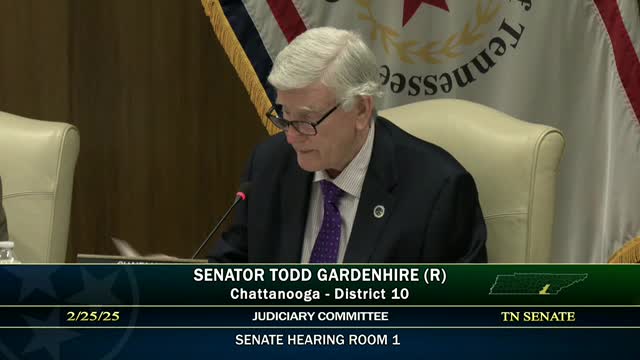Tennessee panel advances bill to toll unlawful-photography statute and broaden victim remedies
Get AI-powered insights, summaries, and transcripts
Subscribe
Summary
Senate Bill 335, a measure to update Tennessee’s unlawful-photography law, advanced out of the Senate Judiciary Committee after victims described how a one‑year criminal statute of limitations prevented prosecutions.
Senate Bill 335, a measure to update Tennessee’s unlawful-photography law, advanced out of the Senate Judiciary Committee after victims described how a one‑year criminal statute of limitations prevented prosecutions.
The bill’s sponsor, Sen. Jon Yarbrough, told the panel the measure was brought to him by a group of women victimized by the same man and aims to “update our statute on unlawful photography, largely to accommodate changes to technology and some deficiencies in the law.” Victim Brooke Farrell said detectives told her a recovered file contained images of her but that the one‑year statute had run before investigators could identify her. “I was one month too late,” Farrell said, adding that civil remedies felt like insufficient justice for victims.
The committee approved an amendment (Amendment 3929) offered by Yarbrough that does three things: tolls the statute of limitations for unlawful-photography offenses during any period when the defendant concealed the crime, revises the definition of “disseminate” to include modern means such as transfer or otherwise making material accessible, and permits victims to petition for an order of protection related to the offense. Sen. Lamar moved the bill onto the committee’s docket and Sen. Kyle seconded the motion; the committee adopted the amendment by voice vote and later approved the bill on a roll call (9–0), sending it to the calendar.
Committee members and legal staff clarified how the tolling provision would work. Legal counsel confirmed that under the amendment, following discovery the victim would have one year from discovery to prosecute, consistent with the bill’s text discussed in the committee. During questioning, Sen. Stevens noted the bill’s aim to reflect evolving technology and patterns of misconduct that produce large volumes of files; Yarbrough emphasized the change would help future victims obtain a path to justice.
The testimony included three additional victims—Erica Thomas, Casey Nunley and Emily Benavides—who identified themselves as available to answer questions and supported the amendment. Committee chair Gordon Hire and other members thanked the witnesses for their advocacy.
The committee action was limited to the statutory changes described; no sentencing changes were proposed in the hearing record. With the amendment adopted and the roll call vote recorded, the bill was placed on the Senate calendar for further consideration.
Votes and formal actions recorded in committee are reflected below.
—
(Reporting note: testimony and the amendment text in committee focused on three specific changes: (1) statutory tolling during concealment, (2) modernization of “disseminate” language, and (3) permitting victims to petition for protective orders. The bill as amended moves to the Senate calendar.)
